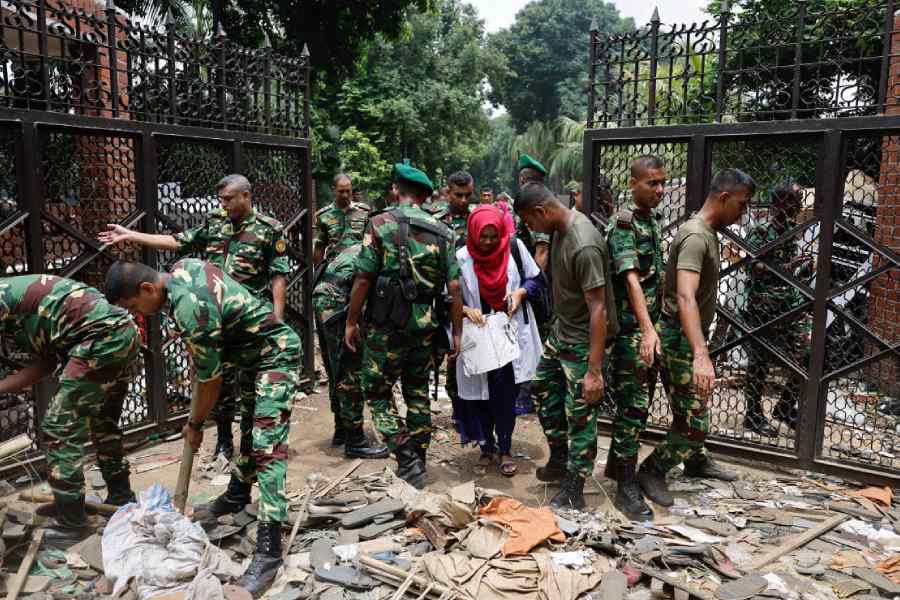British asylum appeared a tough ask for Sheikh Hasina a day after the former Bangladesh Prime Minister had fled to India, with the Labour government calling for a UN-led investigation into the events of the past few weeks in Bangladesh.
As options elsewhere in Europe and the Gulf were being explored for Hasina, India found itself in the uncomfortable position of having to provide her refuge in the interim while opening up channels of communication with the new regime in Dhaka.
External affairs minister S. Jaishankar gave no indication of where Hasina was or what her plans were in his statements in both Houses of Parliament or at an all-party meeting the government had convened in the morning to build a consensus before breaking its silence on Bangladesh.
The leader of the Lok Sabha Opposition, Rahul Gandhi, is said to have enquired about Hasina’s plans and whereabouts at the meeting, but the minister pleaded inability to reveal the details at this juncture.
The Gandhis have a personal equation with Hasina, having been closely involved with her when she first took refuge in India after her father Mujibur Rahman and most other family members were assassinated in August 1975. A meeting with the Gandhi family is invariably on her schedule every time she visits India.
In his statement to the Rajya Sabha and then the Lok Sabha, Jaishankar briefly touched upon the circumstances that brought Hasina here.
“On 5th August, demonstrators converged in Dhaka despite the curfew. Our understanding is that after a meeting with leaders of the security establishment, Prime Minister Sheikh Hasina apparently made the decision to resign,” he said.
“At very short notice, she requested approval to come for the moment to India. We simultaneously received a request for flight clearance from Bangladesh authorities. She arrived yesterday evening in Delhi.”
No more was said about her stay and no question was asked on the floor of either House on the subject, the Opposition abiding by an assurance given at the all-party meeting.
While Rahul asked about Hasina and whether a foreign hand had fuelled the protests, Trinamool MPs Sudip Bandyopadhyay and Derek O’Brien requested the government to keep the Bengal chief minister in the loop.
The meeting had been convened clearly to ensure that no party spoke out of turn in the two Houses after the minister made his statement.
Unlike other occasions, the government’s tone was conciliatory and acknowledged the role of previous governments in building the bilateral relationship.
“India-Bangladesh relations have been exceptionally close for many decades over many governments,” Jaishankar underscored in his statement in a bid to limit any political damage the Bangladesh situation might cause his party.
Referring to concerns across the Indian political spectrum about the recent violence and instability in Bangladesh, the foreign minister wrapped up his brief statement with another tip of the hat to the consensus on the relationship.
“I seek the understanding and support of the House in regard to sensitive issues regarding an important neighbour on which there has always been strong national consensus,” he said.
Jaishankar said the government was in touch with the authorities in Dhaka and that the situation relating to minorities was being monitored, particularly since their businesses and temples had come under attack at many places on Sunday.
At the same time, the minister acknowledged the efforts being made in Bangladesh to protect minorities.
“There are reports of initiatives by various groups and organisations to ensure their protection and well-being. We welcome that, but will naturally remain deeply concerned till law and order is visibly restored,” he said.
“Our border guarding forces have also been instructed to be exceptionally alert in view of this complex situation.”
Jaishankar revealed that India had over the past weeks been advising restraint and dialogue to the Hasina government as well as other political parties in Bangladesh, though his ministry had officially maintained it was Dhaka’s internal matter.
Referring to the tensions since the January elections and the July violence, he said: “Throughout this period, we repeatedly counselled restraint and urged that the situation be defused through dialogue. Similar urgings were made to various political forces with whom we were in touch.”
By the time Jaishankar made the statement in Parliament, London had already indicated reluctance to offer asylum to Hasina.
In a statement, foreign secretary David Lammy said: “The last two weeks in Bangladesh have seen unprecedented levels of violence and tragic loss of life…. The people of Bangladesh deserve a full and independent UN-led investigation into the events of the past few weeks…"











